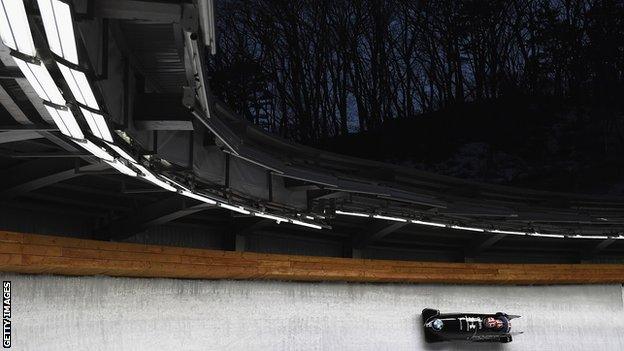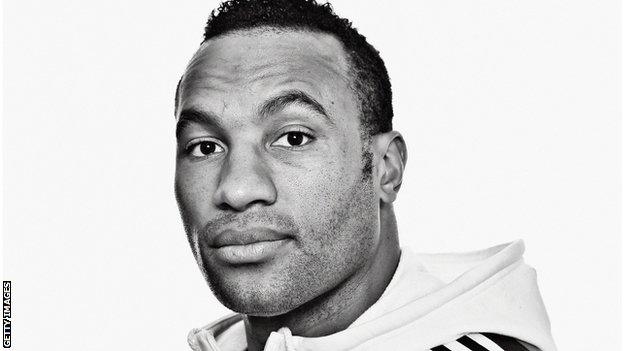Great Britain Olympic bobsleigh coach accused of racism by athlete
- Published

Great Britain finished fifth in the men's bobsleigh at the 2014 Winter Olympics
A senior coach working with Great Britain's Winter Olympic bobsleigh squad has been accused of racism amid multiple complaints over a "toxic atmosphere" in the sport.
Earlier this year, a host of athletes wrote anonymously to the chief executive of governing body the British Bobsleigh and Skeleton Association (BBSA) to "share concerns over the behaviour of key performance and management staff".
In confidential documents obtained by the BBC, the athletes told Richard Parker their concerns were "of the highest order, mentioning bullying, racism, sexism and discrimination".
However, the following month they were told no disciplinary action would be taken following an internal review because no "formal complaints" were made.
Details of racism claims
Amid revelations that will add to the athlete welfare crisis sweeping through British sport, and just eight months before the 2018 Winter Games in Pyeongchang, we can reveal that among individual letters sent to Parker:
One athlete alleged they had experienced "racism several times" from a senior coach, and that the coach referred to black people as "lazy" and had "a blatant dislike towards people of colour".
Another athlete claimed there was "a racial bias in favour of caucasian males" on the performance programme and "a racial stigma against black drivers".
According to further complainants, "sexist comments are regular, there have been claims of racist remarks which all get ignored", "the culture is one of fear... athletes are literally terrified of putting a foot wrong", and there was "dictatorship within the management".
The BBC can also reveal the BBSA received an earlier allegation of discriminatory language by a different senior coach towards an athlete three years ago.
The BBSA's response
In April, after a meeting between Parker and a group of athletes, an internal review to investigate the most recent allegations was set up, led by three members of the BBSA board.
Parker - who became chief executive in October 2014 - emailed athletes asking them "to maintain confidentiality" and to "not discuss with anyone outside of the BBSA".
Last month, Parker wrote again to his athletes, telling them "no formal complaints were made against individual staff members and therefore no disciplinary action will take place".
He added: "It is clear that a number of athletes feel strongly about the performance environment and how they are communicated to.
"We recognise that there is a group of athletes who have a significant level of discontent and the climate for them is sub-optimal… we will look to address this ASAP.
"Equally, we recognise that for some, everything is working well at the moment… we hope you understand that we have listened to you as athletes and want to work together to ensure we can win medals in Pyeongchang and beyond."
Bobsleigh and skeleton - a guide | |
|---|---|
Bobsleigh is a team sport in which men compete in two and four-man sleighs and women compete in two-woman crews. They must negotiate a sequence of tricky turns at speeds of up to 150km/h (93mph), over a course that is on average one mile long. | |
Skeleton athletes must negotiate a series of tricky twists and turns, on a one-person sled that offers little protection from the ice or barriers, while reaching speeds of up to 140km/h (87mph). | |
Source: The BBSA, external |
In a subsequent letter, he said: "The review could not substantiate the allegations made. The process now moves to looking forward.
"The BBSA takes athlete welfare very seriously… the review did highlight areas which necessitate a further look at existing procedures to ensure the team achieves maximum success."
But Parker then added: "The current coaching and staffing structure has the board's full trust and confidence."
Parker said a sports psychologist would work with coaches and athletes, and that one-to-one support would be made available.
He told athletes: "Please be all reminded that of course it is possible for anyone to file a complaint against a member of staff, or an appeal, but if we receive a formal complaint, there is a proper disciplinary process to follow and these allegations will need to be put directly to the member of staff, who have the right to present their own case."
BBC Sport understands some athletes were disappointed by the outcome of the review and confused that their written allegations had not been deemed formal complaints.
In a statement, the BBSA told BBC Sport: "The BBSA take any matters regarding athlete care very seriously and have investigated concerns raised by athletes regarding the performance environment. No formal complaints have been made.
"However, regardless of this, we have taken steps to ensure all athletes and staff are clear on the process in which to address any concerns. We have also agreed with athletes and staff a plan to continue collaborating on ways of working together to ensure we deliver a positive and open environment for all."
The BBSA also points out that of the 19 bobsleigh athletes in contention for Olympic selection, 10 are black or mixed race.
Concerns over athlete welfare
The BBSA is the latest governing body to become embroiled in an athlete welfare controversy after inquiries into duty of care standards at British Swimming, British Canoeing and GB Taekwondo over recent months.
British Cycling is bracing itself for the publication of an independent review into its culture after claims by former rider Jess Varnish and other Olympians and Paralympians of sexism and bullying.
The BBSA is the best funded of Britain's winter sports governing bodies, receiving about £10m from UK Sport for the 2014-18 Olympic cycle, with £4.5m for the bobsleigh programme and £5.5m for the skeleton programme.
It received a funding increase last year after UK Sport conducted an investment review. Great Britain finished fifth in the men's bobsleigh at the Sochi 2014 Winter Games.
In a statement, UK Sport said: "We are aware of issues raised by athletes within the sport of bobsleigh and that these have been the subject of an internal investigation and ongoing review by the British Bobsleigh and Skeleton Association.
"Athlete welfare and duty of care is of paramount importance to us. We are conscious that as a system we have lessons to learn around culture.
"We have therefore taken the decision to appoint a head of sport integrity to advise on policies and procedures for handling and reviewing cultural or behavioural issues as they arise and to provide assurance on the appropriateness and timeliness of actions taken by individual sports governing bodies."
Earlier bobsleigh complaint

Former bobsleigher Henry Nwume raised concerns
It can also be revealed that this is not the first time the BBSA has been faced with athlete complaints.
In further correspondence obtained by the BBC, just weeks after the Sochi Games former bobsleigher Henry Nwume raised concerns around "a pervading culture of fear inhibiting questioning of coach or management actions, reinforced by lack of transparency and control of data" and alleged he had been told by a fellow athlete he had been the victim of discriminatory language by another senior coach.
In a letter to the then chairman of the governing body, Sir Andrew Ridgeway, dated 21 March 2014 - which was also emailed to members of UK Sport's Performance Advisor team - Nwume alleged a fellow athlete had been told: "I knew you would be late because you're black" and "black drivers do not make good bobsleigh drivers".
Nwume, a former professional rugby union player who won the Heineken Cup with Wasps in 2004 before serving in Afghanistan as a British Army medic, subsequently left the sport to return to his full-time military role. He is not among the athletes who complained to the BBSA this year.
Ridgeway told the BBC: "[The allegations] were immediately investigated and the individual was formally disciplined and warned as to his future conduct. There has been, as far as I know, no repetition of his inappropriate behaviour.
"In the interests of openness and transparency, British Bobsleigh agreed that the complaint should be taken to the British Athletes Commission, the appropriate authority for dealing with such cases.
"The outcome of this process was that British Bobsleigh policies were deemed to have been entirely satisfactory and that they had been appropriately implemented. The recommendation was that the policies be kept under regular review. There was no mention of a culture of fear."
'Environment of harassment and bullying'
British bobsleigh created 'toxic atmosphere' for McCullough Young
A damning view of the culture at the BBSA was also offered by another former athlete, Ben McCullough Young.
Speaking exclusively to the BBC, McCullough Young - who was part of the Great Britain set-up during the 2015-16 season - said: "I decided to break off all contact with British Bobsleigh just because it was such an amazingly unpleasant experience being part of the squad. I basically came away with the sense that I had just been exploited for a couple of months.
"Physical and mental wellbeing was definitely jeopardised… I don't have a history of mental health problems, but it got to the point for me where I was experiencing what I could only describe as bouts of anxiety and depressive episodes every single day.
"I just really didn't want to be there. Sometimes I had my fingers crossed that I would sustain some kind of injury that would put me in a category in which I definitely couldn't slide, it was that bad.
"It was definitely an environment of harassment and bullying."
With the 2018 Winter Games approaching, McCullough Young believes the "toxic atmosphere" he experienced during his time at the BBSA continues to be an issue.
"I still stay in touch sporadically with some of the guys involved in the set-up. From what I could tell, the morale in camp was just as low as it was when I was part of the set-up and there were the same sort of experiences of exploitation and neglect," he said.
"[Some members of British Bobsleigh] think of [their athletes] as expendable assets.
"It's ludicrous. It's just reprehensible really. Ever since I left, things have happened which have made me more and more sure that my decision to just leave the set-up was the right thing to do."